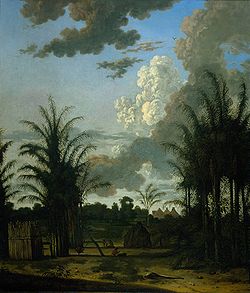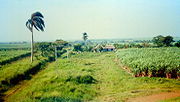
Jeronimo Clifford
Encyclopedia

Suriname
Suriname , officially the Republic of Suriname , is a country in northern South America. It borders French Guiana to the east, Guyana to the west, Brazil to the south, and on the north by the Atlantic Ocean. Suriname was a former colony of the British and of the Dutch, and was previously known as...
in the late 17th century.
Life
Suriname was settled by the English in 1650, but surrendered to the Zeelanders in 1674. Of the 120 English families living there 80 families wanted to leave. Two ships, the Hercules and the America were sent to transport 1100 or 1200 people to BarbadosBarbados
Barbados is an island country in the Lesser Antilles. It is in length and as much as in width, amounting to . It is situated in the western area of the North Atlantic and 100 kilometres east of the Windward Islands and the Caribbean Sea; therein, it is about east of the islands of Saint...
or Jamaica
Jamaica
Jamaica is an island nation of the Greater Antilles, in length, up to in width and 10,990 square kilometres in area. It is situated in the Caribbean Sea, about south of Cuba, and west of Hispaniola, the island harbouring the nation-states Haiti and the Dominican Republic...
. In August 1675 Clifford sold his plantaion to Rowland Simpson and left the month after. Clifford and his son returned to Suriname a year later, when the interim-governor Pieter Versterre (who seems to have been involved in the affair) did not give permission to the London moneylender to pay them.
In 1683 Jeronimy married the Englishwoman Dorothea Matson, who had inherited Courcabo on the death of her husband Abraham Schoors. Courcabo was the largest sugar-plantation in Suriname (1500 acres), with a mill, a boiling, a dwelling and an overseer's house, a cook room, a cattlehouse, 22 huts for 117 slaves. During its existence from 1675 to 1737 it accounted for 6% of all sugar production, though its history is not entirely clear. Clifford then travelled to Amsterdam
Amsterdam
Amsterdam is the largest city and the capital of the Netherlands. The current position of Amsterdam as capital city of the Kingdom of the Netherlands is governed by the constitution of August 24, 1815 and its successors. Amsterdam has a population of 783,364 within city limits, an urban population...
and signed a protest about the skipper's treatment of some seamen. In 1685 Jeronimo Clifford bought a plantation on Jamaica, but was fined in Paramaribo. (The order of the above events is unclear.) In 1687 he made a new attempt to bring over his possessions over to Jamaica.
In 1685 Jeronimo's father Andrew left Suriname and transferred his business affairs to his son. After this, in 1689, Jeronimo Clifford hit difficulties with governor Johan van Scharphuizen
Johan van Scharphuizen
Joan or Johan van Scharphuysen, Scharphuizen or Jan van Scherpenhuizen was a Dutch colonist, a judge in Suriname, a slave-trader, colonial governor from 1689 to 1696 on behalf of the Society of Surinam, and a considerable plantation-owner.-Life:Van Scharphuizen most probably had his roots in...
, causing bad blood and years of court proceedings undertaken by Jeronimo that 60 years later finally had to be arbitrated by the English. In 1689 Jeronimo was imprisoned in Fort Sommelsdijck, then in 1692 he was condemned to be hanged, though this was commuted to seven years' imprisonment. Clifford was even allowed to build his own house within the walls of the prison. He was released in 1695 on the stadholder's William III of England
William III of England
William III & II was a sovereign Prince of Orange of the House of Orange-Nassau by birth. From 1672 he governed as Stadtholder William III of Orange over Holland, Zeeland, Utrecht, Guelders, and Overijssel of the Dutch Republic. From 1689 he reigned as William III over England and Ireland...
intervention, while Van Scharphuizen was recalled and was followed by Paul van der Veen.

Society of Suriname
The Society of Suriname was a Dutch private company, modelled on the ideas of Jean-Baptiste Colbert and set up on 21 May 1683 to profit from the management and defence of the Dutch Republic's colony of Suriname...
in multiple compensation proceedings. He signed a protest to William III of England
William III of England
William III & II was a sovereign Prince of Orange of the House of Orange-Nassau by birth. From 1672 he governed as Stadtholder William III of Orange over Holland, Zeeland, Utrecht, Guelders, and Overijssel of the Dutch Republic. From 1689 he reigned as William III over England and Ireland...
and referred to the agreements between Britain and the Dutch Republic
Dutch Republic
The Dutch Republic — officially known as the Republic of the Seven United Netherlands , the Republic of the United Netherlands, or the Republic of the Seven United Provinces — was a republic in Europe existing from 1581 to 1795, preceding the Batavian Republic and ultimately...
set up by the Peace of Breda in 1667 and by the Treaty of Westminster
Treaty of Westminster (1674)
The Treaty of Westminster of 1674 was the peace treaty that ended the Third Anglo-Dutch War. Signed by the Netherlands and England, it provided for the return of the colony of New Netherland to England and renewed the Treaty of Breda of 1667...
in 1674.
In 1700 he wanted to be (or he was) given permission to transport goods and slaves out of Suriname, but demanded a considerably higher sum (342,693 guilders) as damages. In 1702 he wrote a petition to Queen Anne
Anne of Great Britain
Anne ascended the thrones of England, Scotland and Ireland on 8 March 1702. On 1 May 1707, under the Act of Union, two of her realms, England and Scotland, were united as a single sovereign state, the Kingdom of Great Britain.Anne's Catholic father, James II and VII, was deposed during the...
in relation to his proceedings against the directors of the Society of Suriname. The raadpensionaris Anthonie Heinsius
Anthonie Heinsius
Anthonie Heinsius was a Dutch statesman who served as Grand Pensionary of Holland from 1689 to his death in 1720.- Life :...
gave Clifford little chance of success and judged that the case should not be tried in England, but could be tried in the Netherlands. In 1704 he was imprisoned for debt again, this time in the Fleet Prison
Fleet Prison
Fleet Prison was a notorious London prison by the side of the Fleet River in London. The prison was built in 1197 and was in use until 1844. It was demolished in 1846.- History :...
. In 1704, 1705, 1711, 1713, 1714, 1715 and 1720 he filed more protests. Sir Robert Walpole
Robert Walpole
Robert Walpole, 1st Earl of Orford, KG, KB, PC , known before 1742 as Sir Robert Walpole, was a British statesman who is generally regarded as having been the first Prime Minister of Great Britain....
advised him to see off any further claims from the States General
States-General of the Netherlands
The States-General of the Netherlands is the bicameral legislature of the Netherlands, consisting of the Senate and the House of Representatives. The parliament meets in at the Binnenhof in The Hague. The archaic Dutch word "staten" originally related to the feudal classes in which medieval...
.
Jeronimo Clifford died in 1737, possibly at a bakery near Charing Cross
Charing Cross
Charing Cross denotes the junction of Strand, Whitehall and Cockspur Street, just south of Trafalgar Square in central London, England. It is named after the now demolished Eleanor cross that stood there, in what was once the hamlet of Charing. The site of the cross is now occupied by an equestrian...
, where he is recorded as having rooms in 1727. In 1760 his heirs published a pamphlet with an account of the case and of daily life in Suriname, entitled The Case of Andrew Clifford, and Jeronomy Clifford, late planters in Surinam. Respecting certain claims on the Dutch Government. His family lived in Kent
Kent
Kent is a county in southeast England, and is one of the home counties. It borders East Sussex, Surrey and Greater London and has a defined boundary with Essex in the middle of the Thames Estuary. The ceremonial county boundaries of Kent include the shire county of Kent and the unitary borough of...
.
Sources
- The Case of Jeronimy Clifford, Merchant and Planter of Surinam. A Short Abridgment of Mr. Jeronimy Clifford's Case, Printed and Dated the 26th of March 1711, which he deliver'd in the Year 1711 to her Majesty's most Honourable Privy Council. To the late Dutch Envoy Mr. Vrybergen, and in the Year 1713 to both the Houses of Parliament. London, Printed the 10th of May 1714
- The Conduct of the Dutch, Relating to their Breach of Treaties with England, Particularly Their Breach of the Articles of Capitulation, for the Surrender of Surinam, in 1667; and their Oppressions committed upon the English Subjects in that Colony.With a full Account of the Case of Jeronimy Clifford, late Merchant and Planter of Surinam, deceased; the unparalleled Injuries and Cruelties inflicted on him and his Estate by the Dutch; and the great Losse sustained &c.London, 1760
- The Case and Replication of the Legal Representatives of Jeronimy Clifford; a British Subject; and late Merchant and Planter of Surinam, deceased, to the Information of the Directors of the Society of Surinam, Presented, on the 7th of October 1762, To their High Mightinesses the Lords States General of the United Provinces, &c. London 1763; met uitslaande kaart van Suriname, geflankeerd door delen van Berbice en Cayenne, met opname van de suikerplantage Corcabo

